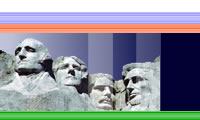A 1909 Act
of Congress allows the BLM involvement where the area under consideration
is largely owned by the public especially where extensive obliteration
has occurred. In 1918, another congressional act went even further,
permitting BLM to conduct resurveys even if the public lands represent
less than half of the involved area. This act also requires that private
land owners bear their proportionate share of the cost of such resurveying
in their area.
Also, many present, private lands were patented from the Federal
Government with mineral reservations. Federal surveyors may be called
upon to survey these lands. In all cases, it is required that no
resurvey shall impair, or diminish the bona fide rights of any claimant.
That is, rights acquired in good faith under the law. To guarantee
that any BLM survey will justly reflect the intentions of an honestly
executed original survey, the Bureau applies the techniques of proportionate
measurement to restore any truly lost corner. Before we assume any
corner is lost, we must do all in our power to be certain that the
original corner location is not merely hard to find.
Fortunately, the process of performing a corner search also uses
the logic of proportionate measurement. Before we go into the various
methods of calculating proportionate measurement, let's review some
terms you will see and hear throughout this program and daily in
cadastral survey work. The use of the term, "half mile"
in reference to north and south, or east and west segments of the
line are not meant to imply that the halves are truly half miles.
These halves were established as half miles during the original
survey, but may be considerably shorter, or longer than what was
originally intended. However, they are still represented as half
miles.


